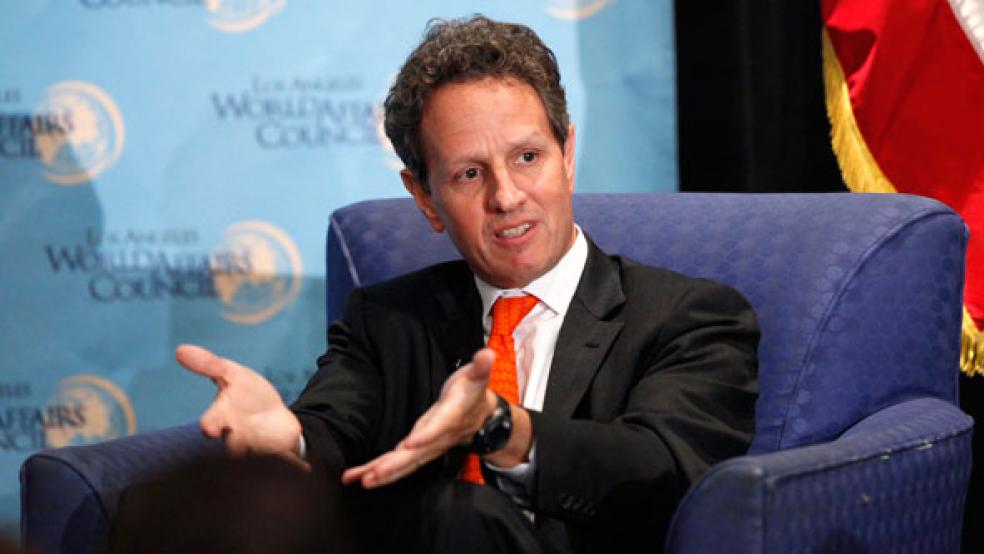Treasury Secretary Timothy Geithner's plans to leave near the end of January put the White House in a tricky spot, depriving the Obama administration of its longest-serving economic adviser for its next fiscal showdown with Congress.

Geithner, who spent his years as Treasury secretary battling the financial crisis and then fighting with Republican lawmakers in 2011 over raising the U.S. debt ceiling, has wanted to leave government service for some time.
The Treasury Department said Geithner would stick to his previously announced schedule to stay until sometime around the January 21 inauguration. Bloomberg News reported that Geithner would leave at the end of January.
Obama chose Geithner to lead the just-ended negotiations with Congress to avert the December 31 fiscal cliff of spending cuts and tax hikes that threatened to push the economy back into recession. But the deal, which preserved most of the Bush-era tax breaks for Americans, sets up a series of crucial fiscal deadlines by delaying automatic spending cuts until March 1 and not increasing the government's borrowing limit.
That puts Obama in the tough spot of nominating another Treasury secretary and asking the Senate to approve his choice when lawmakers are in the middle of another budget battle. "The confirmation process will be nasty regardless as it will be a referendum on Obama's economic and deficit plans," said Chris Krueger, a policy analyst with Guggenheim Partners.
RELATED: The Debt Ceiling: What Exactly Is It?
Geithner has already resorted to using emergency measures in order to give the Treasury Department the ability to pay government bills and avoid a damaging debt default. The country hit its $16.4 trillion debt limit December 31, and the Treasury is on track to run out of funds in February. If Congress does not raise the debt ceiling on time, the United States would default on its debt payments and roil markets worldwide.
"From a confidence standpoint, you don't want to change the man at the top during a crisis," said Ward McCarthy, chief financial economist at Jefferies & Co in New York, adding that even Geithner could still provide guidance as an adviser after he leaves. Lawmakers are at war with each other over the size of government, and Republicans plan to use the debt ceiling increase to extract massive spending cuts from Democrats. And Geithner had managed to win the respect of Republican lawmakers, especially in the volatile House of Representatives.
SOMEONE TO FILL THE VOID
Geithner was instrumental in helping Republican President George W. Bush and then Obama fight the 2007-09 credit crisis, first as the president of the New York Federal Reserve Bank and then as Obama's only Treasury secretary.
He survived calls for his resignation over how the Treasury handled the $700 billion Troubled Asset Relief Program bank bailout fund. He fought with Republican lawmakers over raising the debt ceiling in 2011. As he tried to resign, Obama asked him to stay through the November presidential election.
RELATED: Obama Should Tap a Wall Street Ace to Replace Geithner
Obama's chief of staff, Jack Lew, is widely expected to be chosen to replace Geithner. But a number of key Republicans do not like working with Lew, the former budget director, which could potentially exacerbate the raw relations between the administration and Congress.
"Geithner's leadership and expertise would undoubtedly be a tremendous asset to the president and the country as we confront this next challenge," said Max Baucus, the Democratic chairman of the Senate Finance Committee, which is in charge of vetting the next treasury secretary.
It is not clear who Obama would choose to lead negotiations for the next set of fiscal deadlines. Vice President Joe Biden, who helped broker the fiscal cliff deal, or Rob Nabors, the White House's main liaison to Congress, could fit that bill. The Treasury Department said it did not plan to make any further announcements about the timing of Geithner's departure until after his successor is named.
"That is a lot of experience and steadiness that you would be getting rid of," said Steve Bell, a former Senate budget committee staff director who is now an economic policy director with the Bipartisan Policy Center.




